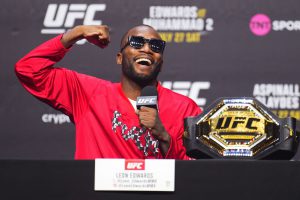A great artist is measured not just by his fame or even his achievements; he’s measured by his influence on others. Fame alone is nothing. An artist can be well-known for quality work or infamous for terrible work.
Achievements are similar. A man can spend a lifetime creating technically amazing things, but his list of achievements is as inspiring as an accountant’s ledger.
Influence is different. Great artists make people want to be artists.
This is taken from literary theory — specifically, the work of literary critic Harold Bloom — but it applies to the martial arts, too. Just like Bloom’s “strong poets” who influence all subsequent poets, we have our collection of martial artists whose influence permeates certain arts.
For example, karate was never the same after Mas Oyama created kyokushin, and contemporary grappling arts are infused with the strategies and techniques of Jigoro Kano’s judo.
But in our time, only one martial artist has achieved an influence that spans everything: Bruce Lee.
Bruce Lee’s influence is everywhere in the martial arts. It’s in everyone who studies a traditional art and chafes against its restrictions. It’s in our easy acceptance of cross-training. Indeed, it’s in our pluralist attitude toward martial truth that allows us to study different styles and learn things from each of them.
Even when you turn your attention to sport fighting and reality-based self-defense, you can see Lee’s influence. It’s evident in the way MMA focuses on functional technique while still trying to be a martial art, and in combatives it’s evident because jeet kune do is part of the lineage of pioneers such as Jim Wagner.
But Bruce Lee’s influence extends outside the martial arts, too. In the film world, he embodies the martial arts. For years after he died, Hong Kong moviemakers churned out pale imitations of Lee’s now-classic films.
No Retreat, No Surrender took it one step further, making Lee’s ghost a major character. The influence of the “Little Dragon” showed up in mainstream films, as well. For example, Eddie Murphy said in interviews that he was imitating Lee in 48 Hrs. during scenes in which he’s stalking the bad guy.
Bruce Lee also has been an enduring pop-culture figure. Sometimes it’s subtle — like Urge Overkill singer/guitarist Nash Kato borrowing the name of Lee’s Green Hornet character for the stage and calling one of the band’s albums Exit the Dragon. Sometimes it’s ironic — like Mark Wahlberg’s Bruce Lee-idolizing adult-film star in Boogie Nights.
Lee’s influence is in all these things, but most of all, it’s in the millions of people who’ve seen his movies or read his books and said, “I want to do that!” His particular combination of martial arts, philosophy and kung fu theater was exactly what they were looking for, and it sent them on a million martial arts journeys.
Influence like that isn’t necessarily benign, however.
Bloom’s literary theory is about the anxiety of influence. That is, great poets inspire people to love poetry and write it themselves. But the great poets’ work is so powerful and compelling that it suppresses the creativity of new poets, and that’s why most poetry is derivative and weak. Only the strongest poets manage to create something original.
Again, the martial arts are similar. You can see the humbling influence of Lee in all the eclectic styles that have been launched since the 1970s but never really went far. They all claimed to meld the best of many styles into one great style, but they wound up being less compelling than jeet kune do.
You also can see it in the would-be martial philosophers like me, who try to write something compelling and original. Whatever seemingly new ideas or approaches we have, a little research usually shows Lee was there first.
Only time will tell how long Bruce Lee’s influence will last in the martial arts. But while it does last, ambitious martial artists can’t avoid it. They have to find a way to extend or surpass the truths of jeet kune do.
It’s what Lee had to do when confronted with the genius of wing chun kung fu. First he developed a modified version and called it Jun Fan gung fu, but it was too derivative. So he further developed it into jeet kune do.
Anyone who wants to be a great martial artist will have to overcome that edifice of deep thought and functional technique and build something even better.
Bruce lee philosophy, Bruce lee movie, Jeet kune do, Bruce lee
Black Belt Magazine
Bitcoin
Ethereum
Monero

Donate Bitcoin to The Bitstream
Scan the QR code or copy the address below into your wallet to send some Bitcoin to The Bitstream

Donate Ethereum to The Bitstream
Scan the QR code or copy the address below into your wallet to send some Ethereum to The Bitstream

Donate Monero to The Bitstream
Scan the QR code or copy the address below into your wallet to send some Monero to The Bitstream
Donate Via Wallets
Select a wallet to accept donation in ETH BNB BUSD etc..










